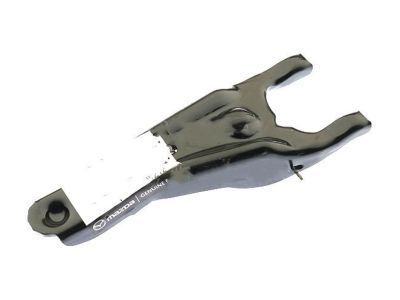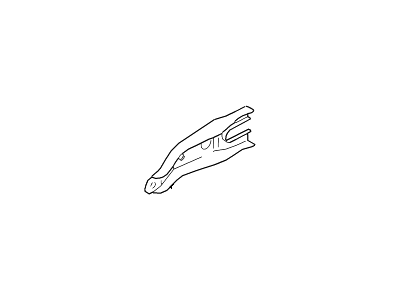

My Garage
My Account
Cart
Genuine Ford Escape Clutch Fork
Release Fork- Select Vehicle by Model
- Select Vehicle by VIN
Select Vehicle by Model
orMake
Model
Year
Select Vehicle by VIN
For the most accurate results, select vehicle by your VIN (Vehicle Identification Number).
1 Clutch Fork found
Ford Escape Clutch Fork
We provide a wide range of Ford Escape Clutch Fork at the best prices possible. If you need Ford Escape Clutch Fork, you can shop with confidence on our website. All our OEM parts come with a manufacturer's warranty and are delivered to your door step with a fast delivery service.
Ford Escape Clutch Fork Parts Questions & Experts Answers
- Q: How to remove and replace a Clutch Disc,Clutch Fork,Pressure Plate and Release Bearing in a Ford Escape?A:Dust produced by clutch wear is hazardous to your health. Do not blow it out with compressed air or inhale it. Avoid using gasoline or petroleum-based solvents to remove the dust. Use brake system cleaner to flush the dust into a drain pan. After the clutch components are wiped clean with a rag, dispose of the contaminated rags and cleaner in a covered, marked container.To remove the clutch, access to its components is normally achieved by removing the transaxle, leaving the engine in the vehicle. Check the clutch for wear and replace worn components as necessary when the engine is being removed for major overhaul. However, the relatively low cost of the clutch components compared to the time and trouble spent gaining access to them warrants their replacement anytime the engine or transaxle is removed, unless they are new or in near perfect condition. Remove the transaxle from the vehicle. Support the engine while the transaxle is out, preferably using an engine support fixture or a hoist from above. The clutch fork and release bearing can remain attached to the transaxle housing for the time being. To support the clutch disc during removal, install a clutch alignment tool through the clutch disc hub.Carefully inspect the flywheel and pressure plate for indexing marks. If they cannot be found, scribe or paint marks yourself so the pressure plate and the flywheel will be in the same alignment during installation. Loosen the pressure plate-to-flywheel bolts in a criss-cross pattern until all spring pressure is relieved. Then, hold the pressure plate securely and completely remove the bolts, followed by the pressure plate and clutch disc.When inspecting clutch components, look for problems such as wear on the clutch disc. Inspect the flywheel for cracks, heat checking, grooves and other obvious defects. A machine shop can smoothen slight imperfections. Inspect the clutch disc lining and replace it if in doubt about its condition. The release bearing should also be replaced along with the clutch disc.Check the machined surfaces and the diaphragm spring fingers of the pressure plate. If damaged, replace the pressure plate. Check the pilot bearing in the end of the crankshaft for excessive wear and replace it if necessary. To remove the pilot bearing, use a slide hammer and puller attachment.To install a new pilot bearing, lightly lubricate the outside surface with grease, then drive it into the recess with a bearing driver or a socket. Clean the flywheel and pressure plate machined surfaces with brake cleaner, lacquer thinner, or acetone before installation. No oil or grease should be on these surfaces or the lining of the clutch disc.Position the clutch disc and pressure plate against the flywheel with the clutch held in place with an alignment tool. Ensure the disc is installed properly. Tighten the pressure plate-to-flywheel bolts only finger tight, working around the pressure plate. Center the clutch disc by ensuring the alignment tool extends through the splined hub and into the pilot bearing in the crankshaft. Tighten the bolts in a criss-cross pattern to prevent distorting the cover and remove the alignment tool.Lubricate the inner groove of the release bearing with high-temperature grease. Also, place a small amount of grease on the release lever contact areas and the transaxle input shaft bearing retainer. Install the clutch release bearing. Install the transaxle and all components removed previously.
- Q: How to remove, inspect, and install a clutch release bearing and Clutch Fork on Ford Escape?A:Dust produced by clutch wear is hazardous to your health. DO NOT blow it out with compressed air and DO NOT inhale it. DO NOT use gasoline or petroleum-based solvents to remove the dust. Brake system cleaner should be used to flush the dust into a drain pan. After the clutch components are wiped clean with a rag, dispose of the contaminated rags and cleaner in a covered, marked container. REMOVAL: Remove the transaxle. Pull the clutch fork off the ballstud and slide the release bearing off the input shaft along with the clutch fork. INSPECTION: Wipe off the bearing with a clean rag and inspect it for damage, wear, and cracks. Hold the center of the bearing and rotate the outer portion while applying pressure. If the bearing doesn't turn smoothly or if it's noisy or rough, replace it. INSTALLATION: Lightly lubricate the friction surfaces of the release bearing, ballstud, and the input shaft bearing retainer with high-temperature grease. Install the clutch fork and bearing onto the input shaft. The remainder of installation is the reverse of removal.










